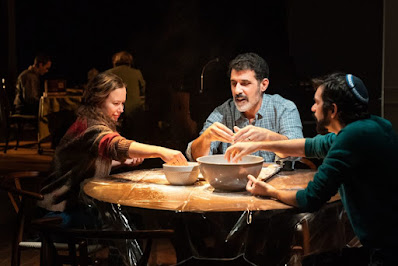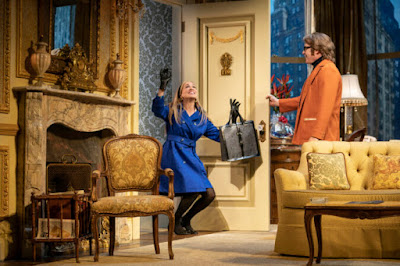3/22/22: Take Me Out
What: 2nd Stage's starry revival of Richard Greenberg's play about a mixed-race MLB player who comes out as gay, and the reverberations of that announcement--including how it affects a quiet gay accountant who's just been assigned the newly-out player as a client and who now finds himself surprisingly invested in baseball, both as a sport and a metaphor.
And? Between this and Caroline, or Change last season, I'm officially hitting the milestone of seeing revivals of shows whose original runs I caught. Which means, inevitably, my brain's going to start making comparisons. And a few epiphanies, like how I didn't realize til I saw the play again this week how much Take Me Out influenced my playwriting voice as a college student--especially a narrator who keeps changing his mind mid-thought about how he wants to frame a story.* And speaking of segues, that leads to my biggest complaint with this revival: the script is written such that every character at some point changes his mind about what he's saying midsentence, cuts himself off, and starts a new thought. This was very clear in the original production directed by Joe Mantello, But here, under Scott Ellis's direction, the nuance of too many of these moments is missed, with only one overall thought being communicated. It doesn't obfuscate the meaning of the play, but it removes a lot of the interesting depth from it (since this is a problem across the whole cast, I'm laying blame with the director). I'm also laying blame with both him and lighting designer Kenneth Posner, for too often not sufficiently illuminating their actors' faces. Especially with this cast, where two of the three leads have more camera than stage credits and so do most of their work in their face, we need to see what those faces are doing. My final complaint before moving on to the positives is that I didn't feel like this production knew what its center was--like it couldn't decide if it was the mind (Kippy), the heart (Mason), or the enigma (Darren), and somehow landed on none of the above.
Positives! Scott Ellis has done a good job with finding verisimilitude in clubhouse behavior, what the players do while they're talking about whatever they're talking about. Jesse Tyler Ferguson is always a delight onstage and he is lovely at charting Mason's growing enthusiasm for baseball, and how much he's learning about himself. Brandon J. Dirden, who's been getting so much work lately (yay) is excellent as always, charming and aloof and ultimately shatteringly dismissive. Michael Oberholtzer and Jesse Williams acquit themselves well as the antagonistic forces in the play, sometimes trying to reach each other, but too often at such a stark divide they may as well be standing by the destruction of the Tower of Babel (the image made sense in my head, leave me alone). And at the end of the day it's still a good, if imperfect play (a friend of mine has raised some valid criticisms about how "safe" both of the gay characters are, as neither of them are sexually active), and I'm glad Greenberg got the chance to make a few minor tweaks to the text to recognize how certain conversations about both consent and race are changing.
*[Another interesting connection: both plays feature an exchange in the denouement where the white character asks if they can be friends again and the Black character either denies or questions whether they were friends in the first place.]
 |
| Jesse Williams, center, as Darren Lemming, and the cast of Take Me Out. Photo by Joan Marcus. |
3/23/22: Paradise Square
What: A new musical from Christina Anderson, Craig Lucas, Larry Kirwan, Jason Howland, Nathan Tysen, and Masi Asare, about the historic Five Points in lower Manhattan during the American Civil War, when free Black people and Irish immigrants lived together in harmony, and all gathered in Nelly O'Brien's brothel-pub-homebase, Paradise Square. But tensions soon rise, stirred by a local city "boss" and fears of what will happen when the war ends.
And? Before I get into my issues, I want to start off with the good this time: it is so wonderful to finally see Joaquina Kalukango leading a musical. She's a powerhouse talent, and it's been a long time coming. She brings nuance, intelligence, passion, and a tightrope balance of strength and vulnerability to her portrayal of Nelly, a Black woman thriving in a white man's world, and elevating her songs to a higher level. The choreo is an impressive contrast (and sometimes blend) of Irish Step and African Step, led by some talented Dance Captain/ringers in the cast (Chloe Davis, Colin Barkell, and Garrett Coleman, who for better or worse outshine the two principal characters who are meant to be excellent dancers). Allen Moyer's multi-level scenic design is effectively skeletal, a reminder of the scaffolding that frames so many New York buildings-in-progress, and perhaps a foreshadowing that this thriving community has a clock ticking on its existence.
Now then. There are a lot of cooks in this kitchen, even leaving out the six writers. In addition to director Moises Kaufman, there is not only a choreographer (Bill T. Jones), but also a Musical Stager (Alex Sanchez), and two people specifically for Irish & Hammestep choreo (Garrett Coleman, Jason Oremus). There is also a lot this show is trying to do. It's a very ... full show. But with this crowded atmosphere, there's not a lot of space to carve out real individualized characters. Kalukango's Nelly is fully realized, a person with strengths, weaknesses, and choices she must make and live with, but a lot of the others are very nearly stock characters with only a few flavors to play within that space (Annie Lewis, the Fiery Irish sister-in-law; Washington Henry, the earnest young idealist on the run; Frederic Tiggins, the singular embodiment of White Supremacy; Milton Moore, aka Cultural Appropriation; 'Lucky' Mike Quinlan, the Irish ally-turned-traitor, a turn that the show doesn't actually manage to earn). Once you figure out which Type each character is, there are no more more surprises to be had out of them. This is true as well for the story being told.
I can't help thinking of Ragtime, another ambitious historical musical about race in America, also produced by that ratfink Drabinsky (yes, he's back, yes he's producing this show, and no, I have no idea why anyone is still trusting him with their money. It's his fault we lost Ragtime too soon! /rant). Both shows set out to give space to a part of American history that's been erased, to confer dignity to Black people in a society that would prefer they remain invisible, and to wish quietly for a more peaceful future. But Ragtime had more variety and modulation in its score, whereas most of the songs here sound too similar--I craved desperately for a moment of quiet and instead too often I got another bombast. Even one of the more poignant plights, as sung by young Owen, "Why Should I Die in Springtime," becomes a big dance number both times it's sung (though I did like its dramatic pairing with "I'd Be a Soldier"--these two were the strongest songs for me). And though the choreo does strong work in the show to differentiate between the African Step and Irish Step for the ensemble, the music rarely reflects that cultural dichotomy. I want to honor the ambition that went into making this show, including how many talented artists are involved, but ultimately the show is often enough nearly three hours of Same. It's not there yet, but I think somewhere underneath all the bluster, there's a good story to be told, and a good show.







